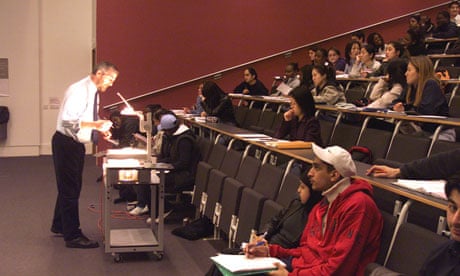Bad Supervisors? Where Is The Professional Accountability?
Sorry, this is not a ground-breaking, thought-provoking analysis post, and not an all-out-bitchfest either; but a topic which continues to be raised day-after-day by research students - issues with Supervisors, and their apparent lack of professional accountability. It's simply a topic that still needs discussion (much like common sense, sadly).
I know I am wading in to a very touchy subject; but truth is, this is one of the reasons I started The Third Degree - concerns over quality of supervision and the impact that has on research students progress. The supervision experience (for student, as well as supervisor) isn't exactly all 'strawberries and cream'; sometimes its 'sh1t and stones' too.
The need to both improve for some, and standardise for others, the supervision experience, is important. Be it enhanced training for supervisors, the increased adoption of student-supervisor contracts, or simply better reporting and evaluation mechanisms to monitor supervisor contributions; something must be done to ensure that students disadvantaged by inadequate supervisory experiences can still come through the PhD journey relatively unscathed.
No two experiences are alike, no issue; but we have to strive to ensure each research student receives a 'fair deal' with the supervision afforded to them.
This may be an old opinion piece, but it is still relevant today. My question is: How can we continue to improve 'supervision'?
----------
[Anonymous Academic]
A demoralising and sarcastic professor left me wondering if I should be doing a PhD at all – and I’m not alone.
PhD students’ relationships with their supervisors are pivotal; not only in terms of producing a good thesis, but ensuring academic and professional development. But while PhD candidates’ work is regularly checked by supervisors, it is far less common, to have formal checks made on the supervisors, with students assessing their performance.
The imbalance of power in these relationships needs to be acknowledged. It’s not necessarily a bad thing, but only if supervisors use their position and privilege to empower students. When they say and do things that impede learning and advancement, it is an abuse of their authority.
One of the main duties of the role, for example, is to provide feedback on a student’s work. In my experience, this can range from general comments to close editing of sentence constructions and grammar. It can take the form of constructive feedback for improvement, or demoralising sarcasm. I have experienced the full range, and it has had a direct impact on my research. The most negatively couched feedback not only hampered my progress, but left me wondering if I should be doing a PhD at all.
Another vital aspect of supervision responsibility is to be, well, responsible. Unanswered emails only increase the anxiety of a student waiting for feedback on a discussion chapter. Unannounced departures for conferences, holidays and research projects are frustrating, particularly when they could have been discussed in advance.
A friend of mine had to deal with the sudden retirement of his supervisor, whose replacement then left after just six months in the role - he now has one who is on research leave with intermittent access to the internet (or is perhaps just intermittent with his responses).
The tensions and discomfort are more keenly felt by students, I suspect. We can’t simply turn away from an errant supervisor and go to another, but we can’t talk freely about how we feel – this is akin to bad-mouthing your boss.
I previously had to psych myself up for supervision meetings; the barrage of criticism I faced often left me feeling stupid. But this kind of thinking trapped me into becoming even more dependent on my supervisor for words of affirmation that came too little and too late. I constantly questioned whether I was good enough. After months of anxiety and stress, and with advice from others who suffered at the hands of the same supervisor, I made a decision to end the relationship.
Luckily I now have new supervisors who behave in more professional and responsible ways. I don’t believe that there is a perfect supervisor, but the ones I have are giving me the support that I need – being responsive, pre-empting future tasks, and most importantly, making me, a novice researcher, feel that I have a valuable contribution to make.
When students have horrible experiences with their supervisors, they tend to share them in private conversations with friends or in social media rants because there is often no formal channel to address them. My university seems shy about putting in place performance measures of PhD supervision, but is proactive about undergraduate students’ evaluations of papers and lecturers. Is there an assumption that PhD students and supervisors are mature enough to work out mutually satisfactory supervision arrangements?
As it stands, students are often left to manage tense relationships, find informal alternatives to make up for bad or non-existent supervision. Unless things become so strained that it is necessary to change supervisors (as it was in my case), students tend to put up with bad behaviour.
Maybe it’s because they think that’s the way a PhD is, or because they can’t see any face-saving way to remedy the situation. But it’s also because supervisors don’t appear to be accountable to anyone. When I have raised this with the academic staff who support doctoral students, I often get an evasive response – “It’s a tricky situation, isn’t it?” – or just an empathetic nod of the head.
There’s huge pressure on universities to produce research in order to prove their worth. If research is so important, then what about making a little more effort to nurture researchers-to-be?
Universities should not only implement performance evaluations of supervisors, but also cultivate safe spaces for doctoral students to share their issues, and have access to support staff who will be able to provide constructive advice and guide them towards workable strategies and solutions.
We need to get rid of the false notion of low-maintenance supervision relationships between consenting adults. These pairings are in fact high maintenance, and fragile. Ignoring the issues will not defuse a bomb that’s waiting to explode – one that could destroy promising careers.
Article Source: Bad PhD supervisors can ruin research. So why aren't they accountable? | Universities | The Guardian
Image Source: Surviving a ‘Bad Review’ from your boss - PHD Media Australia



Comments
Post a Comment